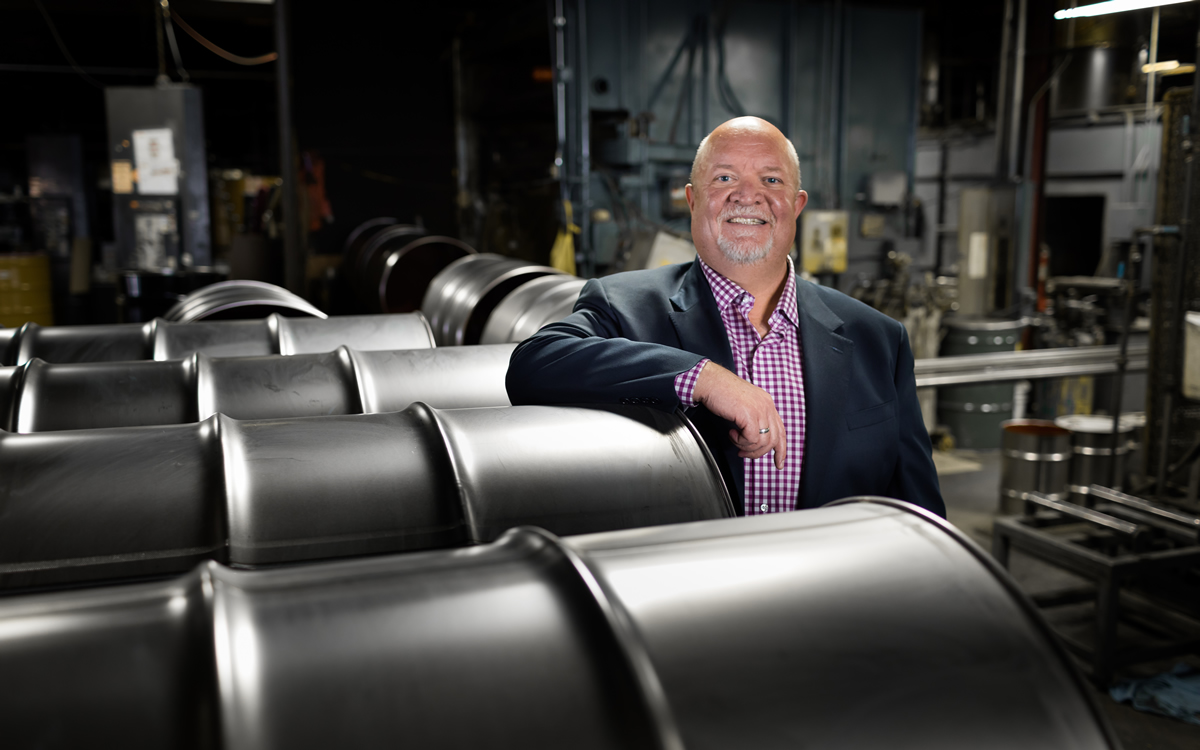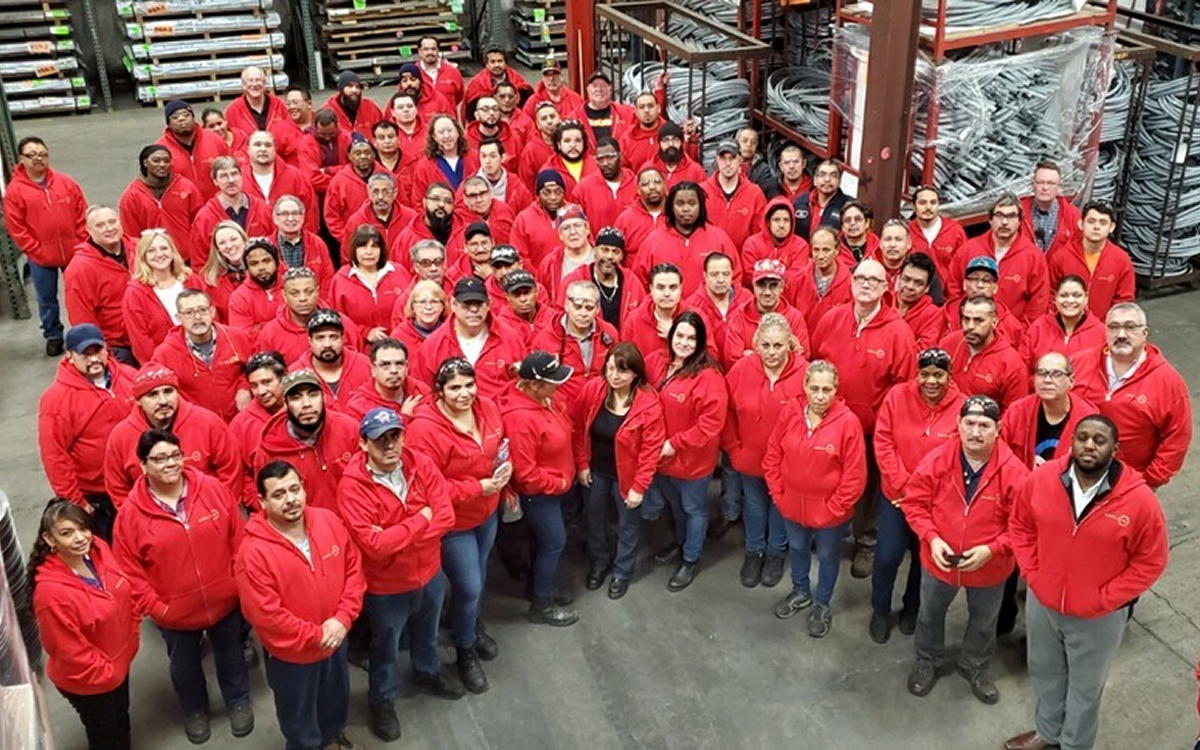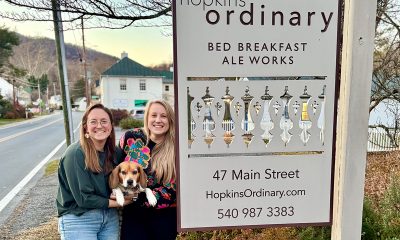Financial
Gay CEO on navigating business challenges during pandemic
Embracing diversity, resisting ‘Old World’ thinking are keys to success for Chicago’s Skolnik Industries

(Editor’s note: This is the first in a multi-part summer series of stories taking a closer look at how a group of diverse LGBTQ entrepreneurs survived and thrived during the pandemic. The series is sponsored by the National LGBT Chamber of Commerce.)
Walking his sparky chihuahua-mix Finnegan with his husband through downtown Chicago is one way Skolnik Industries President Dean Ricker relaxes while successfully guiding a multimillion-dollar corporation through a pandemic.
Ricker told the Blade that diversity was their key to success: diverse products and diverse perspectives.
Chicago-based Skolnik manufactures carbon and stainless steel drums for containing critical contents from hazardous materials to California wines.
While businesses across the United States and the world are experiencing inflation and other pandemic economic impacts, American manufacturing has also been on the decline for decades.
But Ricker finds it important to resist “old world” thinking when confronting current challenges. He explained to the Blade how listening to a variety of perspectives was Skolnik’s not-so-secret ingredient to surviving the pandemic crisis.
“We don’t have to think and operate like it’s 1950,” Ricker said. “As someone who is gay and a leader of a company, I bring a unique perspective to a table where people of all backgrounds are supported.”
National LGBT Chamber of Commerce (NGLCC) Co-founder and President Justin Nelson also told the Blade a commitment to diversity can be critical to economic recovery.
“As the economy regains its footing in the months ahead, leading with a commitment to diversity – as a business owner and a consumer – can help supercharge our economy and our community back to where we should be with our $917 billion purchasing power,” Nelson said.
Ricker added that what set Skolnik apart was “we’re quirky.”
The upbeat executive who describes Finnegan as “the cutest dog in the whole world” is proud that his company strives for a culture where “people of all backgrounds are supported.”
And this inclusive atmosphere proved critical during the COVID-19 crisis.
‘Supplies are down, prices are up’
According to the Federal Reserve Bank of Minneapolis, the “Rust Belt” — industrial manufacturing centers located primarily in the Midwest — began its long, downward spiral after 1950 and experienced a steep decline into the 1980s.
Across this 30-year period, Rust Belt employment fell around 28 percent while manufacturing jobs fell nearly 34 percent.
The Atlanta Fed notes this decline sharply impacted industrial centers across the country, such as in Baltimore, Pittsburgh, Buffalo, Detroit, and Chicago, as well as across the U.S. economy as a whole.
While the current pandemic economic pressures such as labor shortages and supply chain issues were initially focused in the hospitality and food industries, Skolnik noted how challenges spread to the manufacturing sector as well.
In March they tweeted: “Historic trucker shortages, port logjams and labor strikes are just some of the elements that are bringing the wine industry to its knees this year. Supplies are down, and prices are up, across the board.”
And yet, while the pandemic forced many businesses to make tough decisions, Skolnik persevered and thrived.
Zoominfo reports more than $30 million in revenue for Skolnik and more than 200 employees, while Glassdoor, a website where current and former employees anonymously review their employers, states 64 percent of respondents would recommend Skolnik to a friend.
“What is important is the role that diversity plays in the organization,” Ricker said. “You’re not myopic in your thinking.”
LGBTQ inclusivity helps the economy
Ricker, a Crain’s Chicago Business Notable LGBTQ Executive for 2019, said having a “rainbow” of people at the table from different backgrounds and with diverse experiences helped diversify their thinking and their markets — a tactic critical to their survival in an otherwise challenging industry.
“When one industry goes down, like automotive,” he explained. “We saw a pick up in the pharmaceutical industry. During the pandemic we did a lot of packaging related to vaccines and hand sanitizer.”
And research indicates when businesses are LGBTQ inclusive, for example, it has a positive impact on the economy as a whole.
University of Massachusetts Economics Professor M.V. Lee Badgett, a Williams Institute Distinguished Scholar and author of “The Economic Case for LGBT Equality: Why Fair and Equal Treatment Benefits Us All” told the Blade that for an economy to perform well it needs everyone to contribute as much as they have to offer.
“The problem with exclusion is it holds LGBTQI people back,” explained Badgett, who was named one of the 20 most powerful lesbians in academia by Curve Magazine in 2008. “If they aren’t able to develop their knowledge, skills and creativity, then they are not able to contribute as much as they could potentially to the overall economy.”
Badgett said challenges faced by LGBTQ youth, such as bullying and discrimination in housing, employment, and health care, are barriers that keep them from full economic participation over time and can ultimately harm the economy as a whole.
She pointed to the current labor shortage cited by many businesses as a significant pandemic challenge, and explained how bullying in schools can lead to workforce exclusion.
“If LGBT students face bullying in schools, they have lower GPAs, drop out, and are less likely to go to college. A bullying environment is not a good learning environment, and that’s a key tie to employment,” Badgett said. “They will not have the necessary skills and knowledge to take into the world.”
This, in turn, reduces the pool of available workers, a problem further exacerbated by pandemic pressures on disparities already faced particularly by LGBTQ people of color.
“When we can [instead] reduce the level of exclusion, we make it possible for people to put their whole selves into their job and that has a positive impact on everyone,” Badgett said.
“It’s good for LGBT people to be more included economically for their health and long-term economic status,” she added. “We think that will pay dividends over time as the economy prospers.”
NGLCC provided sense of community in a crisis
As a gay business executive, Ricker also noted the important role the NGLCC played in helping Skolnik weather the COVID-19 crisis.
It provided a space where other queer business leaders could gather and problem-solve on a national level. It was also a chance to gain support and learn from each other.
“Just watching other companies going through the same thing we were and hearing their stories served as an inspiration,” he said. “One challenge right now is hiring people. Highlighting that we’re an NGLCC member and an LGBTQ-owned business helps.”
NGLCC’s 2017 economic report found companies that engaged in Pride activities saw an increase in diverse job applicants, new diverse supply chain applicants, and a deeper LGBTQ consumer loyalty.
Ricker added highlighting that membership lets LGBTQ job seekers know Skolnik is a queer-supportive place to work.
“There are a lot of businesses out there where you can’t be yourself,” he said. “I saw our company as an oasis for talented people where they can be themselves. In manufacturing there are unfortunately a lot of ‘old world’ attitudes out there.”
But despite the pandemic and historical challenges his industry faces, Ricker is still excited about the future and a possible resurgence in American manufacturing.
“Supply challenges have highlighted the importance of American manufacturing,” Ricker said. “We still need to make things here in the U.S. And it’s exciting that an LGBTQ-owned business can be a part of that.”
The idea of a recovering economy and the future opportunities it brings for his industry really “jazzes him up,” along with enjoying a nice glass of a California Cabernet aged in one of Skolnik’s barrels — the flavor sweetened from “knowing that we had something to do with its production.”

A group of Skolnik Industries employees (Photo courtesy Skolnick Industries)
Real Estate
2026: prices, pace, and winter weather
Lingering snow cover, sub-freezing temperatures have impacted area housing market

The D.C. metropolitan area’s housing market remains both pricey and complex. Buyers and sellers are navigating not only high costs and shifting buyer preferences, but also seasonal weather conditions that influence construction, inventory, showings, and marketing time.
Seasonality has long affected the housing market across the U.S. Activity typically peaks in spring and summer and dips in winter; however, January and February 2026 brought unusually cold spells to our area, with extended freezing conditions.
Persistent snow and ice-covered roads and sidewalks have gone for days, and in some cases weeks, before melting. While snow accumulation normally averages only a few inches this time of year, this winter saw below-normal temperatures and lingering snow cover that has significantly disrupted normal activity.
Rather than relying on neighborhood teenagers to shovel snow to make some extra money, the “snowcrete” has required ice picks, Bobcats, and snow removal professionals to clear streets and alleys, free our cars from their parking spaces, and restore availability of mass transit.
These winter conditions have had an adverse impact on the regional housing market in several ways.
- Construction slowdown: New builds and exterior improvements often pause during extended cold, resulting in delayed housing starts when we need affordable housing in the worst way.
- Listing preparation: Cleaning crews, sign installers, photographers, and stagers with trucks full of furniture may be unable to navigate roads and need to postpone service.
- Showings and open houses: Simply put, buyers are less inclined to schedule visits in hazardous conditions. Sellers must ensure walkways and parking areas are clear and de-iced and be able to vacate the property while viewings are taking place.
- Inspection and appraisal delays: Like buyers and sellers, ancillary professionals may be delayed by unfavorable weather, slowing timelines from contract to close.
- Maintenance and repairs: Properties with winter damage (e.g., ice dams or frozen pipes) may experience repair delays due to contractor availability and supply chain schedules. Snow and cold can also affect properties with older and more delicate systems adversely, leading some sellers to delay listing until better conditions arrive.
- Availability of labor: Increasingly, construction, landscaping, and domestic workers are reluctant to come into the District, not because of ice, but because of ICE.
Overall, the District has shown a notable increase in days on the market compared with past years. Homes that once sold in a week or less are now often listed for 30+ days before obtaining an offer, especially in the condominium and mid-range house segments. While part of this shift can be attributed to weather and climate, interest rates, uncertain employment, temporary furloughs, and general economic conditions play key roles.
Nonetheless, we continue to host some of the region’s most expensive residences. Historic estates, including a Georgetown mansion that sold for around $28 million, anchor the luxury segment and reflect ongoing demand for premium urban property.
But even in this high-end housing sector, marketing strategies are evolving based on seasonal realities. Price reductions on unique or niche properties, such as undersized or unconventional homes, reflect a broader market adjustment where competitive pricing can shorten selling time.
For example, a beautifully renovated, 4-story brick home with garage parking and multiple decks that overlook the Georgetown waterfront sold in early February for 90 percent of the list price after 50 days on the market.
At the other end of the spectrum, a 2-bedroom investor-special rowhouse in Anacostia only took eight days to sell for under $200,000, down 14 percent from its original list price. In addition, four D.C. homes took more than 250 days to sell, including an 8-bedroom rooming house that was on the market for 688 days and closed after a 23 percent downward price adjustment.
Some frustrated sellers are simply taking their homes off the market rather than dropping prices below their mortgage balances, although we are beginning to see the resurgence of short sales for those who must sell.
Condominiums and cooperatives offer many opportunities for buyers and investors, with 1,100 of them currently on the market in D.C. alone. List prices run the gamut from $55,000 for a studio along the Southwest Waterfront to nearly $5 million for five bedrooms, four full baths, and 4,400 square feet at the Watergate.
So, while Washington metro area prices remain high, the pace of sales now reflects both seasonal and economic realities. Homes taking longer to sell, in part caused by elements of winter, signal a shifting market where buyers can take more time to decide which home to choose and have a better negotiating posture than in recent years.
Accordingly, sellers must continue to price strategically, primp and polish their homes, and prepare for additional adverse circumstances by reviewing fluctuating market conditions with their REALTOR® of choice.
Valerie M. Blake is a licensed Associate Broker in DC, MD & VA with RLAH @properties. Call or text her at (202) 246-8602, email her at [email protected] or follow her on Facebook at TheRealst8ofAffairs.

Valentine’s Day is often portrayed as a celebration of romantic love — flowers, chocolates, and candlelit dinners. But for many LGBTQ+ individuals and couples, Valentine’s Day can also be a moment to reflect on something deeper: the love that creates a safe, welcoming home.
For LGBTQ+ home buyers and sellers, homeownership is more than a financial milestone—it is an act of belonging, resilience, and pride. Owning a home can mean finally having a place where you can hold hands with your partner on the front porch, decorate with your authentic style, and build a life free from judgment. In this way, buying or selling a home is one of the most meaningful love stories many LGBTQ+ people will ever write.
This Valentine’s Day, whether you’re a first-time gay home buyer, a same-sex couple upgrading your space, or an LGBTQ+ seller moving on to your next chapter, it’s worth thinking about how love, identity, and real estate intersect—and how to navigate that journey with confidence, protection, and the right support.
Love, Identity, and the Meaning of ‘Home’
For generations, LGBTQ+ people were denied equal access to housing, homeownership, and legal protections. Even today, many LGBTQ+ home buyers still face subtle bias, uncomfortable interactions, or outright discrimination in the real estate process.
That’s why finding LGBTQ+ friendly real estate and an affirming gay friendly realtor or lesbian realtor matters so much. A home isn’t just a building—it’s a personal sanctuary. Working with LGBTQ+ real estate agents who understand your lived experience can make all the difference between a stressful transaction and a joyful one.
For over 30 years, GayRealEstate.com has been the leading gay real estate network, connecting LGBTQ+ home buyers and sellers with gay real estate agents, lesbian real estate agents, and LGBTQ+ friendly realtors who truly “get it.” Their mission has always been simple yet powerful: to ensure that every LGBTQ+ person has access to safe, respectful, and inclusive real estate services.
Finding Your Match: Choosing the Right LGBTQ+ Friendly Realtor
Much like dating, finding the right real estate agent is about compatibility, trust, and communication. Here are some key tips for choosing the best LGBTQ+ real estate representation:
- Look for experience with LGBTQ+ clients. Search for a gay realtor near me or lesbian realtor near me through GayRealEstate.com, where agents are vetted for cultural competency and community commitment.
- Ask about their experience with same-sex couple home buying. A strong agent should understand issues like joint ownership, legal protections, and financing considerations.
- Choose someone who listens. You should feel safe sharing your priorities—whether that includes proximity to LGBTQ+ nightlife, affirming schools, or lesbian-friendly neighborhoods.
- Prioritize respect and transparency. Your agent should advocate for you, not just push a quick sale.
The right gay friendly real estate agent isn’t just helping you buy a house—they’re helping you find a place to build your life.
Best Cities for LGBTQ+ Home Buyers
If love is your compass, location is your map. Some of the best cities for LGBTQ+ home buyers consistently offer strong community presence, legal protections, and welcoming neighborhoods:
- Wilton Manors, Florida – A hub for LGBTQ+ culture with thriving LGBTQ+ real estate opportunities
- Palm Springs, California – A long-standing LGBTQ+ retirement and second-home destination
- Provincetown, Massachusetts – Historic LGBTQ+ community with progressive housing protections
- Asheville, North Carolina – Growing market with inclusive real estate services
- Fort Lauderdale, Florida – Diverse, welcoming, and highly sought-after for LGBTQ+ home ownership
Working with GayRealEstate.com allows you to connect with local LGBTQ+ real estate experts who know these markets inside and out.
Navigating Legal Protections in LGBTQ+ Real Estate
Love is universal—but legal protections are not always consistent. Understanding your rights is essential when buying or selling a home as an LGBTQ+ person.
Key protections include:
- Fair Housing Act (FHA): Prohibits discrimination based on sex, which courts have increasingly interpreted to include sexual orientation and gender identity.
- State and local protections: Many cities and states offer additional safeguards against LGBTQ+ housing discrimination.
- Same-sex couple legal considerations: If you are married, joint ownership is typically straightforward. If not, consult an attorney about co-ownership agreements.
A knowledgeable LGBTQ+ friendly realtor from GayRealEstate.com can help guide you through these complexities and connect you with trusted legal professionals when needed.
Buying a Home as an LGBTQ+ Person: Practical Tips
If you’re embarking on your home-buying journey this Valentine’s season, here are smart, practical steps to take:
- Clarify your priorities. Do you want a vibrant LGBTQ+ neighborhood, quiet suburbs, or access to queer community spaces?
- Get pre-approved for a mortgage. This strengthens your position in competitive markets.
- Work with an LGBTQ+ real estate agent. Searching “finding a gay real estate agent” or “finding a lesbian real estate agent” through GayRealEstate.com is a great first step.
- Research inclusive communities. Some neighborhoods are more welcoming than others.
- Know your rights. If you experience bias, document it and seek legal guidance.
Buying a home is an act of self-love—and community love.
Selling a Home as an LGBTQ+ Person
Selling can be just as emotional as buying, especially if your home represents years of memories with your partner, friends, or chosen family.
When selling a home as an LGBTQ+ person, consider:
- Working with a gay friendly realtor who will market your home inclusively
- Highlighting LGBTQ+ community appeal in listings
- Being prepared for potential buyer bias (and knowing how to respond)
- Leaning on GayRealEstate.com’s LGBTQ+ real estate services for trusted guidance
Your story—and your home—deserve respect.
Real Estate for LGBTQ+ Families
More LGBTQ+ couples are raising children, fostering, or building blended families. This makes homeownership even more meaningful.
When searching for real estate for LGBTQ+ families, consider:
- LGBTQ+ affirming school districts
- Family-friendly queer communities
- Safe neighborhoods with inclusive values
- Access to LGBTQ+ resources and social networks
GayRealEstate.com specializes in helping LGBTQ+ families find homes that truly fit their lives.
Love, Pride, and Homeownership
At its core, Valentine’s Day is about connection. For LGBTQ+ people, homeownership can be one of the most profound expressions of love—love for yourself, your partner, your family, and your future.
Whether you are a first-time gay home buyer, a same-sex couple relocating, or an LGBTQ+ seller moving forward, you deserve an experience rooted in dignity, fairness, and celebration.
For over three decades, GayRealEstate.com has stood as the leading source for LGBTQ+ real estate, gay real estate, lesbian real estate, and LGBTQ+ home buying and selling representation. Their nationwide network of gay real estate agents, lesbian-friendly real estate agents, and LGBTQ+ friendly realtors ensures that your real estate journey is guided by professionals who understand your heart—and your home.
This Valentine’s Day, let your next chapter be written in a place where you can truly belong. Because when love leads the way, home is never far behind.
Scott Helms is president and owner of Gayrealestate.com.
Real Estate
New year, new housing landscape for D.C. landlords
Several developments expected to influence how rental housing operates

As 2026 begins, Washington, D.C.’s rental housing landscape continues to evolve in ways that matter to small landlords, tenants, and the communities they serve. At the center of many of these conversations is the Small Multifamily & Rental Owners Association (SMOA), a D.C.–based organization that advocates for small property owners and the preservation of the city’s naturally occurring affordable housing.
At their December “DC Housing Policy Summit,” city officials, housing researchers, lenders, attorneys, and housing providers gathered to discuss the policies and proposals shaping the future of rental housing in the District. The topics ranged from recent legislative changes to emerging ballot initiatives and understanding how today’s policy decisions will affect housing stability tomorrow.
Why Housing Policy Matters in 2026
If you are a landlord or a tenant, several developments now underway in D.C., are expected to influence how rental housing operates in the years ahead.
One of the most significant developments is the Rebalancing Expectations for Neighbors, Tenants and Landlords (RENTAL) Act of 2025, a sweeping piece of legislation passed last fall and effective December 31, 2025, which updates a range of housing laws. This broad housing reform law will modernize housing regulations and address long-standing court backlogs, and in a practical manner, assist landlords with shortened notice and filing requirements for lawsuits. The Act introduces changes to eviction procedures, adjusts pre-filing notice timelines, and modifies certain tenant protections under previous legislation, the Tenant Opportunity to Purchase Act.
At the same time, the District has expanded its Rent Registry, to have a better overview of licensed rental units in the city with updated technology that tracks rental units subject to and exempt from rent control and other related housing information. Designed to improve transparency and enforcement, Rent Registry makes it easier for all parties to verify rent control status and compliance.
Looking ahead to the 2026 election cycle, a proposed ballot initiative for a two-year rent freeze is generating significant conversation. If it qualifies for the ballot and is approved by voters, the measure would pause rent increases across the District for two years. While still in the proposal phase, it reflects the broader focus on tenant affordability that continues to shape housing policy debates.
What This Means for Rental Owners
Taken together, these changes underscore how closely policy and day-to-day operations are connected for small landlords. Staying informed about notice requirements, registration obligations, and evolving regulations isn’t just a legal necessity. It’s a key part of maintaining stable, compliant rental properties.
With discussions underway about rent stabilization, voucher policies, and potential rent freezes, long-term revenue projections will be influenced by regulatory shifts just as much as market conditions alone. Financial and strategic planning becomes even more important to protect your interests.
Preparing for the Changes
As the owner of a property management company here in the District, I’ve spent much of the past year thinking about how these changes translate from legislation into real-world operations.
The first priority has been updating our eviction and compliance workflows to align with the RENTAL Act of 2025. That means revising how delinquent rent cases are handled, adjusting notice procedures, and helping owners understand how revised timelines and court processes may affect the cost, timing, and strategy behind enforcement decisions.
Just as important, we’re shifting toward earlier, more proactive communication around compliance and regulatory risk. Rather than reacting after policies take effect, we’re working to flag potential exposure in advance, so owners can make informed decisions before small issues become costly problems.
A Bigger Picture for 2026
Housing policy in Washington, D.C., has always reflected the city’s values from protecting tenants to preserving affordability in rapidly changing neighborhoods. As those policies continue to evolve, the challenge will be finding the right balance between stability for renters and sustainability for the small property owners who provide much of the city’s housing.
The conversations happening now at policy summits, in Council chambers, and across neighborhood communities will shape how rental housing is regulated. For landlords, tenants, and legislators alike, 2026 represents an opportunity to engage thoughtfully, to ask hard questions, and to create a future where compliance, fairness, and long-term stability go hand-in-hand.




















